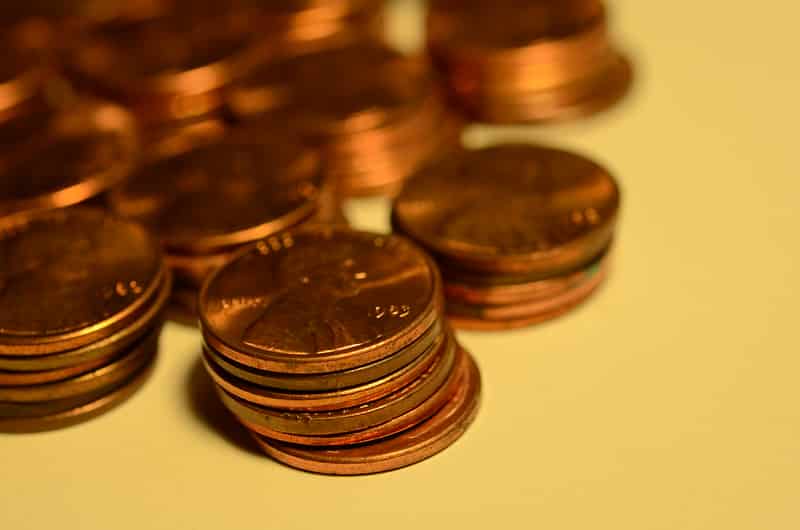
Couponers know that saving a little here and a little there can really add up. As they say, watch the pennies and the dollars will take care of themselves!
But what if there are no pennies? Well, then we may have a problem.
We all survived the great toilet paper shortage of 2020, and intermittent shortages of nearly everything else since then. But one 2020 shortage appears to be making a comeback – retail groups are warning that stores are once again running dangerously low on coins.
The Food Industry Association, National Grocers Association, Retail Industry Leaders Association and several other groups representing retailers and financial institutions are calling on the U.S. Department of the Treasury to resuscitate a 2020 public awareness campaign to “get coin moving” once again.
“The pandemic affected consumer usage of coins by shifting a large number of transactions from cash-based, in-person payments to card-based payments and online sales,” the groups wrote in a letter to the Treasury. “The result is more coins resting in piggy banks and coin jars and fewer being recirculated and available for retailers to facilitate more transactions.”
That may not matter much to those who prefer paying with plastic. But lower-income and older shoppers tend to use cash more often. And when retailers don’t have enough coins to make exact change, that can cause problems at the checkout.
The Treasury has emphasized that there’s not a coin shortage, technically speaking, since there are plenty of coins in existence. There’s just a lack of coins in active circulation. The problem first cropped up in the early days of the coronavirus pandemic, when many safety-conscious shoppers stopped paying in cash, or stopped shopping in physical stores altogether. As restrictions eased and everyday life started getting back to normal, the flow of coins started returning to normal, too.
But now we’re apparently regressing to where we were two years ago. “Coin circulation has slowed and coins are being rationed once more,” the groups’ letter warns. So they’re hoping to ramp up public awareness before it’s too late.
Back in 2020, the Federal Reserve created a U.S. Coin Task Force, which encouraged consumers to use exact change when paying in cash, and to empty their coin jars at banks or at in-store coin kiosks. Several grocery chains asked cash-paying customers if they wanted to “round up” their purchases and donate their change to charity, or have their change credited to their loyalty account to be used on a future purchase.
The task force also recommended promotions in which consumers could “receive a free drink, snack, promotional item or a financial incentive for bringing in coin.” And some merchants like Chick-fil-A ran with the idea, offering coupons for free chicken sandwiches to anyone who brought in rolls of coins to exchange for dollars.
So using coins will not only help your fellow shoppers by helping to alleviate the coin bottleneck, but if things get as dire as they did a couple of years ago, cashing in your coins could prove to be lucrative as well. So spend your pennies – and the dollars, and the free chicken sandwiches, will take care of themselves.
Image source: slgckgc
















Per link you provided, 21 of 50 states prohibit what you describe, and another 6 have restrictions on it that make it hard, so I still see that as MOST states.
No, you remain wrong. 21, or even 27, out of 50 is NOT most.
The word “most” means “greatest in amount, quantity, or degree; 75 percent or more.”
However, rather than being an incorrect pedant — focus on what my main point was — include the taxes in the prices and change the law thereto.
In most states, it is a violation of law to include sales tax in the total shelf price for individual items in the manner you are talking about.
No, that’s NOT true in MOST states. And where is IS true, the law should be changed.
https://www.taxjar.com/blog/retail/can-retailer-include-sales-tax-in-the-price
Several of the local (Denver) grocery stores have signs up asking for change to be used, but when you try to use lots of change either: 1) the self-checkout machines choke up on change (and are incredibly slow), or 2) the cashiers at regular checkout bitch about how this slows down their line and try to send you to one of the coin sorting machines in the store (which take a cut of the coins sorted). The local banks aren’t much better, as most of them also run the coins through a sorting machine and take a cut for doing so. Net effect is that they want the coins, but want you (the customer) to pay for getting them the coins.
And, bottom line is that, legally, “coins are a convenience to facilitate trade” — they are NOT legal tender — so no one actually HAS to take coins anyway.
Only the US government could mess things up do badly. Insanity.
Pennies and nickels (and dimes too) should be abolished. Everything should be rounded down (not up) to the nearest quarter.
The savings from not having to make, store, ship, count, and beg for those coins would more than pay for the difference — and save the US billions. It costs MORE than the face value, especially now, to make anything less than a quarter.
And while they are at it, all business pricing should be mandated to reflect the total cost, including taxes. Where I live, there are FOUR different tax rates on grocery store items and there is NO way a consumer can determine if s/he was properly charged unless each item is purchased separately.
Some stores will itemize each tax by rate, but not by item — most don’t and just slap total tax on at the end of the register tape. I would bet my cache of coins that there are MANY mistakes and that FEW of them are in consumers’ favor.